Introduction
How To Trick Garage Door Sensors: Garage door sensors are an essential safety feature that prevents accidents and injuries by detecting objects or people in the path of a closing garage door. These sensors use infrared technology to send and receive signals. Having the door immediately reverse direction and stop if it encounters an obstacle. While this is a crucial safety measure. There may be instances where you need to trick the garage door sensors for various reasons.
Tricking garage door sensors can be necessary in situations where the sensors are malfunctioning or misaligned, causing the door to stop unnecessarily or not close at all. Additionally, if you have a pet or small child who frequently triggers the sensors. You may want to find a way to bypass them temporarily to avoid constant interruptions. However, it is crucial to highlight that tampering with garage door sensors should only be done in specific conditions and with caution, as it can affect the safety of the system.
Garage door sensors can be fooled in a number of different ways. Depending on the specific situation and the type of sensors installed. One common method is to clean the sensors thoroughly, as dirt or debris on the lenses can interfere with their functionality. By carefully wiping the sensors with a clean cloth and ensuring they are free from any obstructions. You may be able to resolve minor issues and restore proper sensor operation.

Can you bypass the sensors on a garage door?
Yes, it is possible to bypass the sensors on a garage door. However, this is rarely advisable or even allowed. Garage door sensors are an important safety feature that prevents the door from closing if there is an obstruction in its path. These sensors typically use infrared technology to detect objects or people in the door’s path and send a signal to the garage door opener to stop the closing process.
The sensors can be tricked or disabled to avoid detection. One way to disable the sensors is by cutting the wires that connect them to the garage door opener. However, this method is not only dangerous but also illegal. By disabling the sensors, you are compromising the safety of the garage door and putting yourself and others at risk of injury or property damage.
Another method to bypass the sensors is by tricking them. This can be done by placing an object. Such as a piece of cardboard or tape, in front of the sensors to block their line of sight. By doing so, the sensors will not detect any obstruction and the garage door will close as usual. However, this method is also not recommended as it poses a safety hazard. Bypassing the sensors might have dire repercussions as they are meant to prevent injuries and accidents.
It is important to note that tampering with garage door sensors is not only unsafe but also against the law in many jurisdictions. In order to avoid penalties or legal repercussions, garage door manufacturers and installers must adhere to safety rules that require sensors to be enabled. If you want to make sure you and your loved ones are secure, check that your garage door sensors are fitted and working correctly often.
What is the best way to bypass garage door sensors?
Garage door sensors are an essential safety feature that prevents accidents and injuries by detecting objects or people in the path of a closing garage door. However, there may be situations where you need to bypass these sensors temporarily. Such as when the sensors are malfunctioning or when you need to perform maintenance or repairs on your garage door. While it is not recommended to bypass garage door sensors unless absolutely necessary, there are a few methods that can be used.
One method to bypass garage door sensors is to disconnect the sensors from the garage door opener. This can be done by locating the sensor wires that are connected to the opener and disconnecting them. However, it is important to note that this method should only be used as a temporary solution and the sensors should be reconnected as soon as possible to ensure the safety of the garage door.
Another method to bypass garage door sensors is to use a bypass or override switch. To bypass the sensors, simply flip one of these switches located near the garage door opener. This method is more convenient as it allows you to easily bypass the sensors when needed without having to disconnect any wires.
If you are unable to bypass the sensors using the above methods. It is recommended to consult a professional garage door technician. They will have the knowledge and expertise to safely bypass the sensors or repair any issues with them. Attempting to bypass the sensors without proper knowledge or experience can be dangerous and may result in accidents or damage to the garage door.
What makes garage door sensors fail?
Garage door sensors are an essential component of any garage door system. They are equipped with sensors to identify any dangers in the door’s route. Ensuring the safety of people and property. However, like any other electronic device, garage door sensors can fail over time. There are several factors that can contribute to the failure of these sensors, and understanding them can help homeowners prevent or address these issues.
One common reason for garage door sensor failure is misalignment.
Over time, the sensors may become misaligned due to vibrations or accidental bumps. When this happens, the sensors may not be able to detect obstacles accurately, leading to malfunctioning or non-responsive doors. It is important to regularly check the alignment of the sensors and make adjustments if necessary. To accomplish this, it is necessary to visually verify that the sensors are level and facing in the same direction.
Another factor that can cause garage door sensor failure is dirt or debris accumulation.
Dust, dirt, and other particles can accumulate on the sensors, obstructing their ability to detect obstacles. This can result in false readings or complete sensor failure. Regular cleaning of the sensors using a soft cloth or brush can help prevent this issue. It is also important to keep the surrounding area clean to minimize the accumulation of dirt and debris.
Electrical issues can also contribute to garage door sensor failure.
Power surges, faulty wiring, or electrical shorts can damage the sensors or disrupt their functioning. It is important to ensure that the electrical connections are secure and that the wiring is in good condition. If there are any signs of electrical issues, such as flickering lights or tripped circuit breakers. It is advisable to consult a professional electrician to address the problem.
Lastly, extreme weather conditions can also impact the performance of garage door sensors.
Extreme heat or cold can affect the sensitivity of the sensors, causing them to malfunction or become less responsive. It is crucial to choose sensors that are designed to resist the specific weather conditions in your area. Additionally, regular maintenance and inspection of the sensors can help identify any issues caused by weather-related factors.
How do you block a door sensor?
Blocking a door sensor can be done for various reasons, such as privacy, security, or convenience. However, it is important to note that tampering with door sensors may be illegal or against the terms of use in certain situations. Before attempting to disable a door sensor, it is best to check with the relevant authorities or get professional guidance.
One common method to block a door sensor is by using a physical obstruction. Putting anything down will accomplish this. Such as a piece of furniture or a heavy book, in front of the sensor. The object should be large enough to prevent the sensor from detecting any movement or changes in the door’s position. However, it is important to ensure that the obstruction does not cause any damage to the door or the sensor itself.
Door Sensors
Another way to block a door sensor is by using electronic devices or gadgets. For example, some door sensors operate on specific frequencies, and it may be possible to disrupt or jam these frequencies using a signal jammer or a similar device. However, it is important to note that interfering with radio frequencies may be illegal in some jurisdictions, and it can also disrupt other legitimate devices in the vicinity.
In some cases, it may be possible to disable or deactivate a door sensor by accessing the control panel or the main unit of the security system. This typically requires knowledge of the system’s password or security codes. It is important to note that tampering with security systems may be illegal and can have serious consequences.
It is important to reiterate that blocking a door sensor may have legal and ethical implications. Never attempt to disable or tamper with a security system without first consulting an expert or an attorney.
What type of sensor is a garage door sensor?
A garage door sensor is a type of sensor that is specifically designed to detect the position and movement of a garage door. It is an essential component of a garage door opener system. As it helps to ensure the safety and security of the garage and its contents.
One of the most common types of garage door sensors is the photoelectric sensor. This type of sensor uses a beam of light to detect the presence of an object. Such as a person or a vehicle, in the path of the garage door. When the beam of light is interrupted. The sensor sends a signal to the garage door opener to stop or reverse the movement of the door.
Garage Door Sensor
Another type of garage door sensor is the pressure sensor. This sensor is meant to detect any resistance or pressure exerted to the garage door and is normally mounted at the door’s base. When the sensor detects an obstruction, such as a person or an object. It sends a signal to the garage door opener to stop or reverse the movement of the door.
Some garage door sensors also include additional features, such as motion detection or wireless connectivity. These features can provide added convenience and security for homeowners, allowing them to monitor and control their garage door remotely.
To monitor the location and motion of a garage door, a specialized sensor known as a “garage door sensor” is employed. It plays a crucial role in ensuring the safety and security of the garage and its contents. Whether it is a photoelectric sensor, a pressure sensor, or a sensor with additional features. The garage door sensor is an essential component of any garage door opener system.
Sensor
There are several methods that can be used to bypass or trick garage door sensors. Although it is important to note that these actions may be illegal and can compromise the security of your home. One method is to block the sensors with an object. Such as tape or cardboard, to prevent them from detecting any obstacles in their path. However, this method is not recommended as it can lead to accidents or damage to the garage door.
Another method is to tamper with the wiring of the sensors or the control panel. This can involve disconnecting or short-circuiting certain wires to disable the sensors or trick them into thinking that the door is closed when it is actually open. However, this requires technical knowledge and can be dangerous if not done properly.
It is important to remember that attempting to bypass or trick garage door sensors is not only illegal but also puts your home and belongings at risk. Garage door sensors are designed to enhance the security of your home by preventing unauthorized access and detecting any potential obstacles. It is always recommended to follow proper maintenance and troubleshooting procedures or consult a professional if you are experiencing issues with your garage door sensors.
Are there any specific tools or devices that can be used to manipulate garage door sensors?
Manipulating garage door sensors can be a serious security concern, and it is important to understand the potential risks and consequences associated with such actions. While it is not advisable to engage in any activities that compromise the safety of your garage door. It is worth noting that there are certain tools and devices that can be used to manipulate garage door sensors.
One such tool is a laser pointer. Which can be used to trick the sensors into believing that there is an obstruction in the path of the door. By carefully aligning the laser pointer with the sensor. It is possible to create a false signal that triggers the door to stop or reverse its movement. However, it is crucial to remember that tampering with garage door sensors in this manner is not only unethical but also illegal in many jurisdictions.
Can the sensitivity of garage door sensors be adjusted to prevent false alarms or unauthorized access?
Yes, the sensitivity of garage door sensors can be adjusted to prevent false alarms or unauthorized access. Garage door sensors are designed to detect any obstruction or movement in the path of the closing door. And they can be set to different levels of sensitivity depending on the specific needs of the user.
One way to adjust the sensitivity of garage door sensors is by consulting the user manual or contacting the manufacturer of the garage door opener. The manual usually provides instructions on how to adjust the sensitivity settings. Which may involve accessing the control panel of the opener or using a remote control to make the necessary adjustments.
It is important to note that adjusting the sensitivity of garage door sensors should be done carefully and in accordance with the manufacturer’s instructions. Setting the sensors to a very low sensitivity level may prevent them from detecting genuine obstructions. While setting them to a very high sensitivity level may result in false alarms. Finding the right balance is crucial to ensure the proper functioning of the sensors and to prevent any unauthorized access or security breaches.
Are there any potential risks or consequences associated with attempting to trick garage door sensors?
Attempting to trick garage door sensors can have serious risks and consequences. Garage door sensors are designed to ensure the safety and security of the garage and its contents. By bypassing or manipulating these sensors. You are compromising the integrity of the system and putting yourself and your property at risk.
One potential risk is that bypassing the sensors can lead to accidents or injuries. Garage door sensors are designed to detect any obstructions in the path of the door and prevent it from closing on them. By tricking the sensors. You are disabling this safety feature and increasing the chances of someone or something getting trapped or injured by the closing door.
Another consequence of attempting to trick garage door sensors is the potential for unauthorized access. Garage doors are an entry point to your home or property, and by bypassing the sensors. You are essentially leaving it vulnerable to break-ins or theft. Without the sensors detecting any unauthorized entry. It becomes easier for intruders to gain access to your garage and potentially your home.
What are some alternative security measures that can be implemented to enhance garage door safety?
When it comes to enhancing garage door safety. There are several alternative security measures that can be implemented to provide an extra layer of protection. One effective method is to install a garage door alarm system. These systems can detect any unauthorized attempts to open the garage door and trigger an alarm. Alerting homeowners to potential intrusions. Additionally, installing security cameras in and around the garage area can help deter criminals and provide valuable evidence in case of a break-in.
Another alternative security measure is to reinforce the garage door itself. This can be done by installing a heavy-duty lock or a deadbolt on the garage door. Additionally, reinforcing the door frame and hinges can make it more difficult for intruders to force their way in. Furthermore, using a garage door timer can be a useful security measure. This device automatically closes the garage door after a predetermined amount of time. Ensuring that it is not left open accidentally.

Conclusion
Attempting to trick garage door sensors can not only lead to malfunctioning of the sensors but also pose a significant safety hazard. These sensors are designed to detect any obstructions or objects in the path of the garage door, preventing accidents and injuries. By tampering with the sensors, you are essentially disabling this crucial safety feature, putting yourself and others at risk.
Furthermore, tampering with garage door sensors may also void any warranties or insurance coverage you have for your garage door system. Manufacturers and insurance companies often have strict guidelines and requirements for the proper installation and maintenance of garage doors. Including the sensors. Any modifications or tampering can result in the nullification of these agreements, leaving you responsible for any damages or accidents that may occur.
Instead of trying to trick garage door sensors. It is advisable to consult a professional if you are experiencing any issues or concerns with your garage door system. They have the knowledge and expertise to diagnose and resolve any problems safely and effectively. Additionally, regular maintenance and inspections by professionals can help ensure that your garage door and its sensors are functioning optimally, providing you with peace of mind and a secure home.

